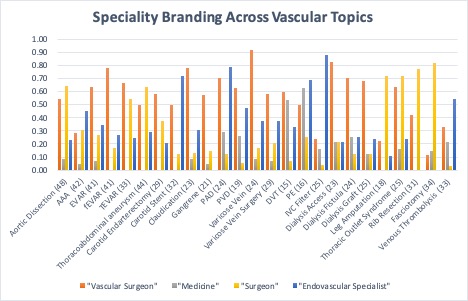The Brand Of Vascular Surgery: What Does The Internet Say About Vascular Surgery And Surgeons?
Omar Sanon, Christine Leinbach, Matthew Carnevale, MD, Issam Kolielat, MD, John Phair, MD.
Albert Einstein College of Medicine, Bronx, NY, USA.
Objective: The presence of vascular surgery branding and information available through online search queries has never been assessed. It was our goal to compile and appraise the information available via internet searches regarding vascular surgery topics. Methods: The google search engine was queried for 25 arbitrary keywords relating to common vascular diagnoses by two separate researchers. The presence of the Society of Vascular Surgery (vascular.org) webpage in the first 25 sites was documented. Each individual site was searched for information regarding the medical field responsible for patient care. Furthermore, each topic related site was assessed for whether the information was presented towards the public or professionals, and whether disease related information was present (screening, risk factors, diagnostic testing, operative treatment, alternative treatment, follow-up, complications, and recovery). The percentage of the first 25 sites that were classified as paid advertisements was also documented. Results: Throughout all topics, there were 357 unique master domains of 1241 total webpages; the most common being ncbi.nlm.nih.gov, mayoclinic.org, and vascular.org. SVS.org was present in 56% of the first page results and least likely to be present in claudication, gangrene, carotid stent, rib resection, thrombolysis, IVC filter, and leg amputation. Vascular surgeons specifically were mentioned as referral physicians in 56.19% of sites. Interventional radiology and general endovascular specialists were mentioned in 19.47% of pages and cardiothoracic surgeons were mentioned in 19.33% (Figure 1). The percent of websites with all information regarding a disease (9 out of 9) was 3.7% with lowest information rating on pages related to dialysis access topics. Advertisements were present in 18.1% of all searches; and mostly with search terms “varicose vein”,” varicose vein surgery” and ”IVC filters.” Conclusions: Patient related information regarding vascular surgery topics are available on the internet but the quality of this content is highly variable and often incomplete. Only half of the searches mention a vascular surgeon as the referral of choice for these medical conditions. Vascular surgeons must be in the forefront of information dissemination to better brand our specialty as the primary providers for these diseases, not only for the general public but also for referring providers. 
Back to 2020 ePosters
